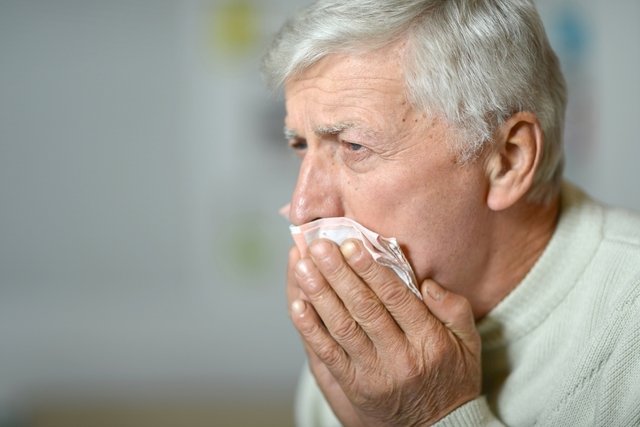The main symptoms of a lung infection are a dry or productive cough, difficulty breathing, and quick, shallow breathing. It is also common to experience a high grade fever that lasts longer than 48 hours, but responds to medications.
A lung infection occurs when many microorganisms enter the body through the upper airway and reach the lungs. Also known as a lower respiratory infection, this condition is common in older adults and in those with a history of a chronic condition, weakened immune system, or long term medication use.
If you notice these symptoms, you should consult a doctor for assessment and diagnosis. The doctor will likely initiate treatment to prevent further complications.

Main symptoms
The main symptoms of a lung infection are:
- Dry cough or productive cough
- Persistent high-grade fever and chills
- Loss of appetite
- Headache
- Chest pain
- Back pain
- Difficulty breathing with quick, shallow breaths
- Rapid heart rate
- Runny nose
If you notice these symptoms, you should consult a doctor for diagnosis and, if confirmed, treatment. The doctor reaches a diagnosis by evaluating symptoms and auscultating the lungs, although he or she may opt to additionally order a chest x-ray, blood work and sputum culture.
Confirming a diagnosis
A family doctor, pediatrician or lung specialist are most likely to diagnose a lung infection. They will evaluate the presenting signs a symptoms, and may order additional testing. Usually, the doctor will order a chest x-ray to assess for any signs of lung damage.
In addition, the doctor may order blood work, like a complete blood count, and culture tests to analyze a nasal swab or phlegm specimen. Culture tests can help to identify the bacteria causing infection, which will help to guide doctor in determining the most appropriate treatment approach.
Treatment options
Treatment for a lung infection is monitored by a doctor. It usually involves rest, adequate hydration and antibiotics, antivirals or antifungals for a 7 to 14 day course. The doctor may also recommend medications to relieve pain and fever, like acetaminophen.
Respiratory physio, which helps to release accumulated mucus in the lungs, may be prescribed for older adults, as they tend to be more bedridden. It is also recommended for patients receiving hospital treatment for a lung infection.
